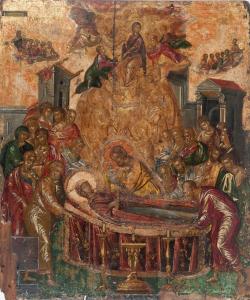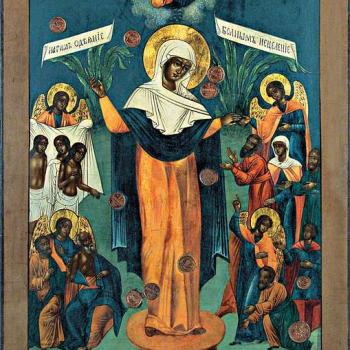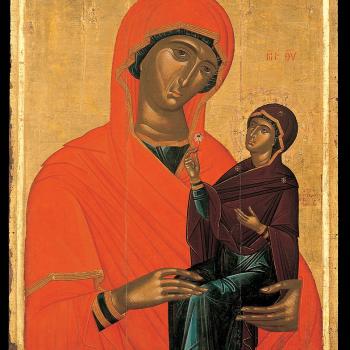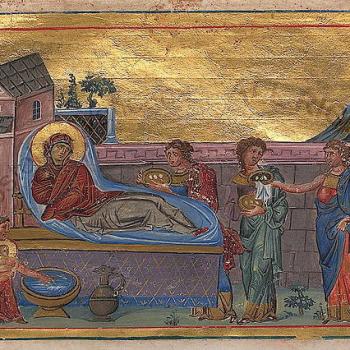
After her death, the Mother of God, Mary, was assumed into heaven; there, she now participates in and experienced the fruit of Jesus’ resurrection for the dead, anticipating our own resurrection in the eschaton. Her assumption serves as the fulfillment of what began with the annunciation: Mary’s yes opened humanity up to God the Word (the Logos). Upon receiving her yes, the Logos assumed human nature and became the God-man, Jesus. His connection with creation, his connection with humanity, is connected with and centered upon Mary, his mother; her humanity was his humanity, and if his humanity was not to see corruption, then she, like him, was not going to be corrupted. And if he is glorified in his humanity, then she, the source of his humanity, also participates in that glorification. Even after her death, she does not lose her connection with us, which is why, after her assumption, it can be said that she continues working on behalf of us all.
The assumption of our nature by God elevates humanity; God became one of us in and through a woman, Mary, meaning, she became an instrument of our salvation. That is, we are liberated by Christ through a woman, which means, we should not look down upon women:
The assumption of our nature was to be also its liberation. And that no one should perchance suppose that the creator of sex despised sex, he became a man born of a woman.[1]
The liberation of humanity, the incarnation, began with a woman, and now the glorification of humanity, after Christ’s resurrection, begins with a woman. Anyone who would disregard the dignity and value of women must look face to face to the Mother of God and realize her greatness transcends their own arrogance.
Mary, who society wanted to undermine and push to the side because she was a woman, experienced what all the lowly, all those who suffer abuse from the systemic structures of sin, experience. Jesus took on his humanity through her, emptying himself of all his divine glory, in order to share with her her connection with the lowly in the world; together, not only do they represent the vulnerable of society, they represent, each in their unique way, the vindication of God for those who are oppressed. All those who have been abused, all those who have been unjustly treated and diminished by society and the powers that be, have God as their vindicator; God grants them a share of the victory of Christ over the powers that be. This, again, is shown both in Christ’s resurrection of the dead, but also in the way Mary participates in the resurrection with her assumption:
Mary’s assumption – seen in the light of Jesus’ resurrection – is hope and promise for the poor of all times and for those who stand in solidarity with them; it is hope and promise that they will share in the final victory of the incarnate God.[2]
This is why, when we reflect on the death and assumption of Mary, the Byzantine lectionary has us reflect upon the kenosis of the Word of God. Christ’s self-emptying love is reflected by Mary and her self-emptying love revealed to us in her yes to God; it leads to true glory, the glory which transcends the powers that be and all the tyrants which would like to override the dignity of others:
Have this mind among yourselves, which was in Christ Jesus, who, though he was in the form of God, did not count equality with God a thing to be grasped, but emptied himself, taking the form of a servant, being born in the likeness of men. And being found in human form he humbled himself and became obedient unto death, even death on a cross. Therefore God has highly exalted him and bestowed on him the name which is above every name, that at the name of Jesus every knee should bow, in heaven and on earth and under the earth, and every tongue confess that Jesus Christ is Lord, to the glory of God the Father (Philip. 2:5-11 RSV).
We must follow the example of Christ and Mary; we must cast aside all vanity, all egotistical pride, and embrace our common human nature, emptying ourselves of all attempts to assume some sort of individualized greatness at the expense of the dignity of others. We must put on the sentiment of Christ so that we can receive the glory which comes from such self-emptying love, the glory revealed to us in Christ’s resurrection from the dead and Mary’s assumption into heaven:
The power of love is sacrifice, and the highest love is sacrificial. The Lord wants and gives such love, as well as its power, to His elect. Their entire life is ascetical struggle, sacrifice, and self-abnegation, with no alleviation, no pleasure. Of such a kind was the love of the Mother of God, which in its entirety was one single sacrifice. Her entire life, along with Her Son’s, aways dedicated to the struggle of sacrificial love, and the sword always and unceasingly pierced Her heart [Luke 2:35]. As the handmaid of the Lord [Luke 1:38], She served Him through the sacrificial love of Her maternal heart, and to this day She, though glorified in the heavens, offers this sacrifice, for she weeps and intercedes for the race of sinful humanity. [3]
Let us, therefore, embrace the power of love, realizing the way love directs us to reject all forms of selfishness. Let us understand our own glorification comes from the glorification of Jesus in his resurrection from the dead, and it is anticipated in the glorification of Mary in her assumption. We are shown by both of them that we are called to follow the path of self-sacrificial love. It is a love which, to be sure, must not lead us to hate ourselves, thinking there is no good in us, but rather, a love which affirms our own worth with the worth of every human person, a love which sees the good in all things, and with God, loves that good, seeking to free it from the corruption of sin.
[1] St. Augustine, “Of True Religion,” in Augustine: Earlier Writings. trans. John H.S. Burleigh (Philadelphia: The Westminster Press, 1953), 239.
[2] Ivone Gebara and Maria Clara Bingemer, Mary Mother of God, Mother of the Poor. Trans. Phillip Berryman (Maryknoll, NY: Orbis Books, 1989), 121.
[3] Sergius Bulgakov. Spiritual Diary. Trans. Mark Roosien and Roberto J. De La Noval (Brooklyn, NY: Angelico Press, 2022), 131, [6/19.III.1925].
Stay in touch! Like A Little Bit of Nothing on Facebook.
If you liked what you read, please consider sharing it with your friends and family!
N.B.: While I read comments to moderate them, I rarely respond to them. If I don’t respond to your comment directly, don’t assume I am unthankful for it. I appreciate it. But I want readers to feel free to ask questions, and hopefully, dialogue with each other. I have shared what I wanted to say, though some responses will get a brief reply by me, or, if I find it interesting and something I can engage fully, as the foundation for another post. I have had many posts inspired or improved upon thanks to my readers.












